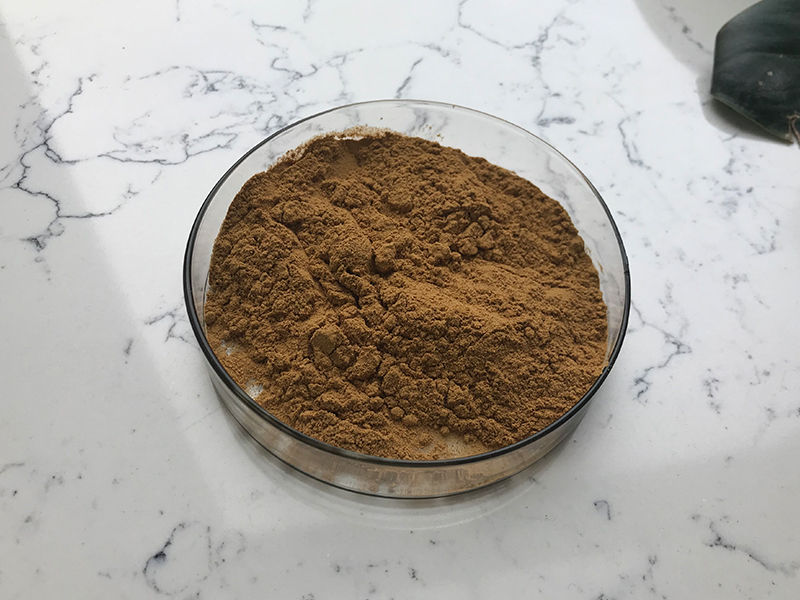Yerba Mate extract, derived from the leaves of the Ilex paraguariensis plant, offers several potential applications due to its rich composition of bioactive compounds. Here are some common uses and applications of Yerba Mate extract:
1.Beverages: Yerba Mate is traditionally consumed as a tea-like beverage in South America. The extract can be used to create ready-to-drink beverages or as an ingredient in energy drinks and herbal teas.
2.Nutritional Supplements: Yerba Mate extract is often used in dietary supplements due to its high content of polyphenols, xanthines (such as caffeine), and vitamins (such as vitamin C).
3.Energy and Alertness: Because of its caffeine content, Yerba Mate extract is used to promote energy and mental alertness. It is sometimes included in energy drinks and supplements marketed for increased focus and stamina.
4.Weight Management: Some studies suggest that Yerba Mate may aid in weight management by increasing metabolism and promoting fat oxidation. It is a common ingredient in supplements marketed for weight loss.
5.Antioxidant Properties: Yerba Mate extract contains antioxidants, such as polyphenols and flavonoids, which can help combat oxidative stress and inflammation in the body.

6.Cardiovascular Health: Research indicates that Yerba Mate may have beneficial effects on cardiovascular health, including lowering LDL cholesterol levels and improving lipid metabolism.
7.Digestive Health: In traditional medicine, Yerba Mate has been used to aid digestion and relieve gastrointestinal issues. Its anti-inflammatory properties may contribute to these benefits.
8.Topical Applications: Extracts of Yerba Mate are also used in some skincare products for their antioxidant properties, which can help protect the skin from damage caused by free radicals.
When using Yerba Mate extract, it’s essential to consider its caffeine content, which can vary depending on the preparation and extraction method. As with any herbal supplement, consulting with a healthcare professional is recommended, especially if you have existing health conditions or are taking medications.
Adverse effects of Yerba Mate Extract
Yerba mate extract, like any other substance, can have both positive and negative effects on health. While yerba mate is often consumed for its potential health benefits, especially as a source of antioxidants and stimulants, it can also lead to adverse effects in some individuals. Here are some potential adverse effects associated with yerba mate extract:
1.Caffeine-related effects: Yerba mate contains caffeine, which can cause jitteriness, nervousness, insomnia, and restlessness, especially in sensitive individuals or those who consume large amounts.
2.Digestive issues: Some people may experience digestive problems such as stomach upset, nausea, vomiting, or diarrhea, particularly when consuming high doses or on an empty stomach.
3.Increased risk of certain cancers: There is some concern that regular, heavy consumption of yerba mate (especially when extremely hot) might increase the risk of esophageal, lung, bladder, and head and neck cancers due to the presence of polycyclic aromatic hydrocarbons (PAHs) formed during the drying process of the leaves.
4.Interference with medications: Yerba mate extract may interact with certain medications, including blood thinners, antidepressants, and stimulants. It can either increase or decrease their effectiveness or lead to adverse effects.
5.Allergic reactions: Although rare, some individuals may be allergic to yerba mate, experiencing symptoms such as rash, itching, swelling, or difficulty breathing.

6.Electrolyte imbalances: Excessive consumption of yerba mate, especially when combined with prolonged physical activity or inadequate hydration, may lead to electrolyte imbalances.
7.Increased blood pressure: Due to its stimulant properties, yerba mate can temporarily raise blood pressure in some people, which may be concerning for those with hypertension.
8.Pregnancy and breastfeeding: It is generally recommended to avoid high doses of caffeine during pregnancy and breastfeeding, as it may affect fetal development or pass into breast milk.
To minimize the risk of adverse effects, it’s important to consume Yerba mate extract in moderation and be mindful of its caffeine content, especially if you are sensitive to stimulants or have underlying health conditions. If you have any concerns or experience persistent side effects, it’s advisable to consult a healthcare professional.
